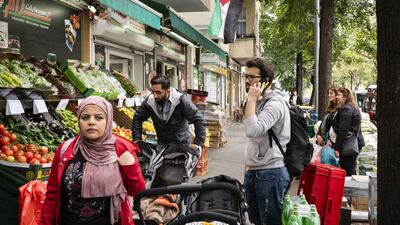Seven years after arriving in Germany at the height of a refugee crisis, tens of thousands of Syrians are on the verge of receiving German passports in what experts regard as a success for their integration.
The number of Syrians taking up German citizenship trebled to more than 19,000 last year, the government said, after some refugees who excelled in integration and language courses managed to beat the usual eight-year waiting period.
Analysts believe as many as 157,000 more could follow in the next two years as the rest of the 2015 group becomes eligible.
“Overall, we can see that the integration of large numbers of refugees has made rapid progress,” said Jan Schneider of the government-backed Expert Council on Integration and Migration.
“We have observed an above-average level of interest in naturalisation among Syrian refugees. At the same time, many of them are starting to fulfil the necessary criteria.”
The intake of hundreds of thousands of Syrians in 2015 was a politically divisive decision by former chancellor Angela Merkel that was bitterly opposed by some Germans.
In the chaos of that summer’s refugee crisis, many Syrians fleeing war arrived at German railway stations and were initially put up in camp beds and gyms as humanitarian workers struggled to cope with the numbers.
Many refugees also arrived from Afghanistan, Iraq and other countries, but Syrians made up the largest number and helped to change the face of a Muslim community in Germany historically dominated by Turkish groups.

The backlash to the 2015 intake fuelled the rise of the far-right Alternative for Germany (AfD) party, and debates over crime, integration and national identity dominated German politics in the subsequent years.
Nonetheless, Mrs Merkel said shortly before leaving office that her much-derided statement in 2015 that “we will manage it” had proved correct, praising the work of local authorities and volunteers in integrating people.
Alongside reports, often seized upon by the right, of violent crimes by refugees, have been more positive stories including of Syrians in Germany helping Ukrainians who fled the war with Russia.
A 34-page report by the expert council said their integration into the labour market was progressing well and the number of social security claimants was down.
However, it said women were less likely to have had jobs or learnt German and that employment had suffered a setback during the coronavirus pandemic when refugees in casual jobs were more likely to be laid off.
Mr Schneider said language courses had paid off especially well because many Syrians were able to complete the naturalisation process in six years.
People can take the six-year shortcut if they can show exceptionally good language skills, perform notably well in their work or education, or have a strong record of volunteer work.
The report said the most conservative estimate was that about 20,000 Syrians a year would take up German citizenship from this year onwards, but that this could rise to many more than 50,000 if they apply at a high rate.

Syrians made up more than one in seven of all naturalised German citizens last year, with 19,100 of them joined by 4,420 Iraqis, 4,020 Iranians and 3,175 Afghans as well as many Turks, Poles and Romanians.
As well as the residency and language requirements, people must pass a citizenship test, be able to support themselves financially, swear loyalty to the democratic order and generally have to give up their old passport.
Mr Schneider said there could be delays if high demand from Syrians continues to exert pressure on short-staffed immigration authorities.
Afghan refugees described frustration at Germany's famously meticulous bureaucracy as they sought protection for their relatives after the fall of Kabul last year.
“Waiting times are already very long in some places and the authorities are often short of staff,” Mr Schneider said. "They are facing significant challenges."
Chancellor Olaf Scholz’s government has promised to cut the waiting time for prospective German citizens to five years of residency with a possible three-year shortcut, instead of eight and six.
It has also committed to relaxing rules on dual citizenship, which is currently permitted only for European Union citizens, people born with two nationalities and in limited cases where special permission is given.


